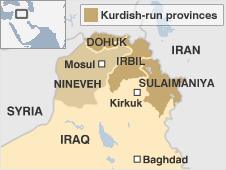HRW presses Iraqi Kurds to ban female circumcision
- Published

Human Rights Watch has called on authorities in the autonomous Iraqi region of Kurdistan to ban the practice of female circumcision, also known as female genital mutilation (FGM).
A report issued by the group on Wednesday said the practice was widespread in Iraqi Kurdistan, and was having a harmful effect on the physical and emotional health of many women.
It called on the Kurdistan Regional Government (KRG) to enact legislation to ban the practice on young girls or unconsenting adult women.
It also called on the KRG to launch a public awareness campaign on its damaging and dangerous consequences.
Female circumcision is virtually unknown in the rest of Iraq, and it is not clear why it seems to have taken root in Iraqi Kurdistan, a deeply traditional and often tribal society.
'Sexual urges stifled'
It has no particular origins in Islam, although some clerics in Kurdistan have welcomed it because they believe it stifles sexual urges in young girls and women.
There are no comprehensive statistics, but a number of recent surveys have shown it to be surprisingly widespread.
One survey carried out early last year by the KRG's Human Rights Ministry suggested that 40% of girls and young women had undergone the procedure in the Chamchamal area, between Kirkuk and Sulaimaniya.
An earlier study by the German-Iraqi NGO Wadi in a broad area between Irbil, Sulaimaniya and Kirkuk yielded an even higher average figure of more than 70%.
The cutting is often done by unqualified people in less than hygienic conditions.
The girls, usually taken along by female relatives, are often unaware of what is about to happen.
Human Rights Watch entitled its report: "They Took Me and Told Me Nothing."
It said the operation "served no medical purpose and could lead to serious physical and emotional consequences".
In 2007, the KRG's Justice Ministry circulated an order that practitioners of FGM should be arrested and punished, but Human Rights Watch said there was no evidence it had ever been heeded.
A draft law banning the practice was also on the statute books of the Kurdistan regional parliament two years ago, but that, and a planned public awareness campaign, appear to have slid into oblivion.
"It's time for the Kurdistan regional government to take concrete actions to eliminate this harmful practice because it simply won't go away on its own," said Nadya Khalife, who researched and wrote the HRW report.
"FGM is a complex issue, but its harm to girls and women is clear."
"Eradicating it in Iraqi Kurdistan will require strong and dedicated leadership on the part of the regional government, including a clear message that FGM will no longer be tolerated."